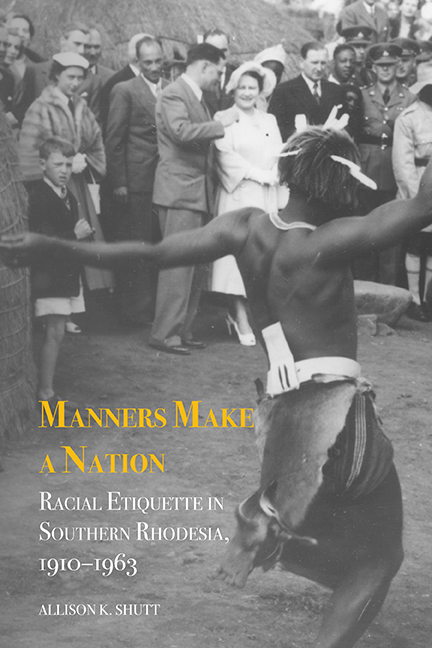5 - Violence and Hospitality
Published online by Cambridge University Press: 04 June 2021
Summary
Escalating claims for better wages, housing, amenities, and treatment exposed the inadequacy of Southern Rhodesia's racial etiquette to maintain a respectable image of friendly race relations that was so important to whites’ self-definition of themselves as Southern Rhodesians. Good race relations were also vital to securing international support for the colony. During the early years of the federation, whites had vacillated between worrying about the negative impact of their racial etiquette on Africans’ political thought and making light of racial rudeness as a mere “pinprick” that was annoying and perhaps embarrassing, but was not fundamentally dangerous to continued white control. Such thinking changed significantly in the last years of the federation. Confrontations with African nationalists disrupted the government's sense of polite governance and directed development. Though the government had used extrajudicial proceedings in the past to quell opposition, now banning political parties and detaining leaders became a main tactic of the government to soften nationalism. In turn, the nationalists, who had regrouped under a new party, the National Democratic Party (NDP), after the banning of the SRANC in 1959, announced a new tactic to usher in change: a “positive action” campaign to disrupt the “settler economy.” As Joshua Nkomo famously put it, “We don't want to swim with them in the pools—we want to swim with them in Parliament.” For whites and government officials especially, the nationalists’ rejection of the historical battle against racial etiquette made manners more significant than ever.
Whites struggled to make sense of Africans’ inroads into public spaces. The radicalism of the NDP unsettled, frustrated, dismayed, and angered government officers and many whites. In the end, many whites (though not all) returned to manners to explain their hostility to Africans using the same buses, hotels, cinemas, and, most notably, swimming pools. Federation partnership had elevated racial etiquette to a subject of government reform, but as the federation unraveled and African nationalism challenged the Southern Rhodesian state, debates over manners turned away from racial etiquette to dialogues about how to craft new manners for a time of African nationalism. Such intense debates among whites revealed the various paths they could envision taking to retain power.
- Type
- Chapter
- Information
- Manners Make a NationRacial Etiquette in Southern Rhodesia, 1910–1963, pp. 138 - 169Publisher: Boydell & BrewerPrint publication year: 2015

